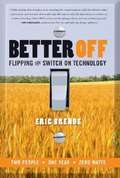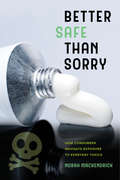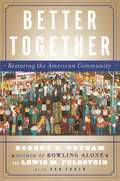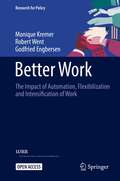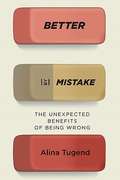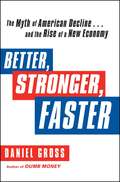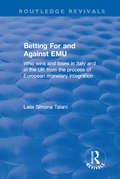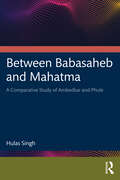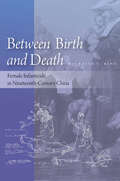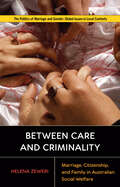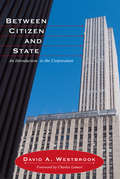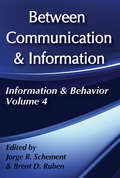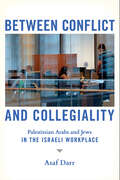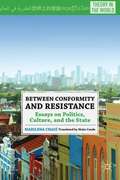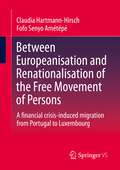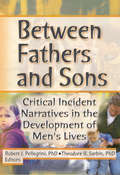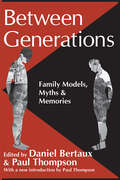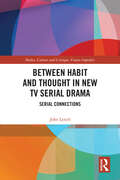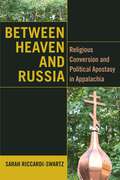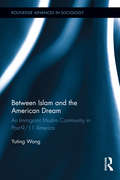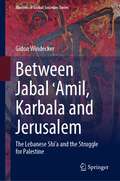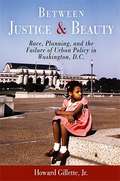- Table View
- List View
Better Off: Flipping the Switch on Technology
by Eric BrendeIn this social experiment, author Brende and his wife live in a primitive and remote community and rid their lives of anything motorized or electric. Describes how the author feels that such a life can decrease stress and increase one's happiness and health.
Better Safe Than Sorry: How Consumers Navigate Exposure to Everyday Toxics
by Norah MacKendrickHow toxic are the products we consume on a daily basis? Whether it’s triclosan in toothpaste, formaldehyde in baby shampoo, endocrine disruptors in water bottles, or pesticides on strawberries, chemicals in food and personal care products are of increasing concern to consumers. This book chronicles how ordinary people try to avoid exposure to toxics in grocery store aisles using the practice of “precautionary consumption.” Through an innovative analysis of environmental regulation, the advocacy work of environmental health groups, the expansion of the health-food chain Whole Foods Market, and interviews with consumers, Norah MacKendrick ponders why the problem of toxics in the U.S. retail landscape has been left to individual shoppers—and to mothers in particular. She reveals how precautionary consumption, or “green shopping,” is a costly and time-intensive practice, one that is connected to cultural ideas of femininity and good motherhood but is also most available to upper- and middle-class households. Better Safe Than Sorry powerfully argues that precautionary consumption places a heavy and unfair burden of labor on women and does little to advance environmental justice or mitigate risk.
Better Together
by Robert D. Putnam Donald J. Cohen Lewis FeldsteinIn his acclaimed Bowling Alone, Robert Putnam describes the United States as a nation in which we have become increasingly disconnected from one another and in which our social structures have disintegrated. But in the final chapter of that book he detects hopeful signs of civic renewal. In Better Together Putnam and coauthor Lewis Feldstein tell the inspiring stories of people who are reweaving the social fabric by bringing their own communities together or building bridges to others. Better Together examines how people across the country are inventing new forms of social activism and community renewal. An arts program in Portsmouth, New Hampshire, brings together shipyard workers and their gentrified neighbors; a deteriorating, crime-ridden neighborhood in Boston is transformed by a determined group of civic organizers; an online "virtual" community in San Francisco allows its members to connect with each other as well as the larger group; in Wisconsin schoolchildren learn how to participate in the political process to benefit their town. As our society grows increasingly diverse, say Putnam and Feldstein, it's more important than ever to grow "social capital," whether by traditional or more innovative means. The people profiled in Better Together are doing just that, and their stories illustrate the extraordinary power of social networks for enabling people to improve their lives and the lives of those around them.
Better Work: The Impact of Automation, Flexibilization and Intensification of Work (Research for Policy)
by Godfried Engbersen Robert Went Monique KremerThis Open Access book provides a thorough analysis of the quality of work in the Netherlands, and suggests policy proposals to promote and facilitate good work for more people. New technology, flexibilization and the intensification of work will have significant consequences for all those who will still have jobs in the future, and – much less studied so far – for the quality of their work. Good work is essential for general well-being: for the individual’s quality of life, for the economy and for society. Good work for everyone should therefore be seen as an important aspiration for companies, institutions, social partners and governments. An essential read for an international audience of academics in the field of the sociology of work, labor economics and social policy, as well as for policymakers and researchers of trade unions, and representatives of other social movements.
Better by Mistake
by Alina TugendA New York Times columnist delivers an eye-opening big idea: Embracing mistakes can make us smarter, healthier, and happier in every facet of our lives. In this persuasive audio book, journalist Alina Tugend examines the delicate tension between what we're told-we must make mistakes in order to learn-and the reality-we often get punished for making mistakes, and therefore try to avoid them or cover them up. In Better by Mistake, Tugend shows that mistakes are everywhere, and suggests that when we acknowledge and identify them correctly, we can improve not only ourselves, but our families, our work, and the world around us. Through fascinating research, Tugend reveals how trying to avoid mistakes can affect us from the earliest stages in our lives and shape us into adults who steer clear of risks and challenges. She takes us behind the scenes into cutting-edge behavioral studies; invites us into the high-stakes world of health care and aviation, where mistakes can cost lives, and delves into the art and science behind learning how to craft a sincere apology and accepting responsibility for mistakes. Bold and dynamic, insightful and provocative, Better by Mistake turns our cultural wisdom on its head to illustrate the downside of striving for perfection, and the rewards of acknowledging mistakes and embracing the imperfection in all of us.
Better, Stronger, Faster
by Daniel GrossFinancial meltdown, a deep recession, and political polarization--combined with strong growth outside the United States--have led to a global bubble of pessimism surrounding America's economic prospects. Bloated with debt, and outpaced by China and other emerging markets, the United States has been left for dead as an economic force. But in this time of grim predictions, Daniel Gross, Yahoo! financial columnist and author of Dumb Money, offers a refreshingly optimistic take on our nation's economic prospects, examining the positive trends that point to a better, stronger future. Widely respected for his Newsweek and Slate coverage of the crash and the recovery, Daniel Gross shows that much of the talk about decline is misplaced. In the wake of the crash, rather than accept the inevitability of a Japan-style lost decade, America's businesses and institutions tapped into the very strengths that built the nation's economy into a global powerhouse in the first place: speed, ingenuity, adaptability, pragmatism, entrepreneurship, and, most significant, an ability to engage with the world. As the United States wallowed in self-pity, the world continued to see promise in what America has to offer--buying exports, investing in the United States, and adopting American companies and business models as their own. Global growth, it turns out, is not a zero-sum game. Better, Stronger, Faster is an account of the remarkable reconstruction and reorientation that started in March 2009, a period that Gross compares to March 1933--as both marked the start of unexpected recoveries. As the U.S. public sector undertook aggressive fiscal and monetary actions, the private sector sprang into action. Companies large and small restructured, tapped into long-dormant internal resources, and invested for growth, at home and abroad. Between 2009 and 2011, as Europe struggled with a cascade of crises, the U.S. got back on its feet--and began to run. Through stories of innovative solutions devised by policy makers, businesses, investors, and consumers, Gross explains how America has the potential to emerge from this period, not as the unrivaled ruler of the global economy but as a healthier leader and an enabler of sustainable growth.
Better, Stronger, Faster: The Myth of American Decline . . . and the Rise of a New Economy
by Daniel GrossFinancial meltdown, a deep recession, and political polarization--combined with strong growth outside the United States--have led to a global bubble of pessimism surrounding America's economic prospects. Bloated with debt, and outpaced by China and other emerging markets, the United States has been left for dead as an economic force. But in this time of grim predictions, Daniel Gross, Yahoo! financial columnist and author of Dumb Money, offers a refreshingly optimistic take on our nation's economic prospects, examining the positive trends that point to a better, stronger future. Widely respected for his Newsweek and Slate coverage of the crash and the recovery, Daniel Gross shows that much of the talk about decline is misplaced. In the wake of the crash, rather than accept the inevitability of a Japan-style lost decade, America's businesses and institutions tapped into the very strengths that built the nation's economy into a global powerhouse in the first place: speed, ingenuity, adaptability, pragmatism, entrepreneurship, and, most significant, an ability to engage with the world. As the United States wallowed in self-pity, the world continued to see promise in what America has to offer--buying exports, investing in the United States, and adopting American companies and business models as their own. Global growth, it turns out, is not a zero-sum game. Better, Stronger, Faster is an account of the remarkable reconstruction and reorientation that started in March 2009, a period that Gross compares to March 1933--as both marked the start of unexpected recoveries. As the U.S. public sector undertook aggressive fiscal and monetary actions, the private sector sprang into action. Companies large and small restructured, tapped into long-dormant internal resources, and invested for growth, at home and abroad. Between 2009 and 2011, as Europe struggled with a cascade of crises, the U.S. got back on its feet--and began to run. Through stories of innovative solutions devised by policy makers, businesses, investors, and consumers, Gross explains how America has the potential to emerge from this period, not as the unrivaled ruler of the global economy but as a healthier leader and an enabler of sustainable growth.
Betting for and Against EMU: Who Wins and Loses in Italy and in the UK from the Process of European Monetary Integration (Routledge Revivals)
by Leila S TalaniThis title was first published in 2000: An analysis of the extent to which the outcomes of the process of European monetary integration and, particularly, of the development of the debate over the establishment of EMU, have been influenced by domestic politics and by domestic economic interest groups in Italy and in the United Kingdom. From an empirical point of view, the work provides an account of the development of Italian and British socio-economic interest groups towards the issue of European monetary union from the making of the EMS until the establishment of EMU.
Betting on Macau: Casino Capitalism and China's Consumer Revolution (Globalization and Community #35)
by Tim SimpsonA comprehensive look into how Macau&’s recent decades of gambling-related growth produced one of the wealthiest territories on the planetBetting on Macau delves into the radical transformation of what was formerly the last remaining European territory in Asia, returned to the People&’s Republic of China in 1999 after nearly half a millennium of Portuguese rule. Examining the unprecedented scale of its development and its key role in China&’s economic revolution, Tim Simpson follows Macau&’s emergence from historical obscurity to become the most profitable casino gaming locale in the world. Identified as a UNESCO World Heritage Site and renowned for its unique blend of Chinese and Portuguese colonial-era architecture, contemporary Macau has metamorphosed into a surreal, hypermodern urban landscape augmented by massive casino megaresorts, including two of the world&’s largest buildings. Simpson situates Macau&’s origins as a strategic trading port and its ensuing history alongside the emergence of the global capitalist system, charting the massive influx of foreign investment, construction, and tourism in the past two decades that helped generate the territory&’s enormous wealth. Presented through a cross section of postcolonial studies and social theory with extensive insight into the global gambling industry, Betting on Macau uncovers the various roots of the territory&’s lucrative casino capitalism. In turn, its trenchant analysis provides a distinctive view into China&’s broader project of urbanization, its post-Mao economic reforms, and the continued rise of its consumer culture.
Between Babasaheb and Mahatma: A Comparative Study of Ambedkar and Phule
by Hulas SinghThis book is a critical comparative study of Jotirao Phule and Bhimrao Ramji Ambedkar, modern India's two most prominent dalit leaders. Although they were not close contemporaries, they came to construct a firm structure of not only dalit ideology, but also dalit methodology to emancipate the oppressed and depressed sections of society. The book deals with their ideas in a new light highlighting aspects of convergence and contrast in their respective approach to philosophy, religion, society, and culture. It argues that deep down in his philosophic orientation, Phule was quintessentially closer to Gandhi than to Ambedkar. The author also contends that the usage of the term dalit exclusively in the caste-communitarian sense is essentially a product of post-independence political appropriation rather than social evolution. The book specifically brings to light the dynamics of humanism and nationalism on the one hand and that of communitarianism on the other in the context of twentieth-century colonial India. Notably, Gandhi is brought in the narrative to complete the triumvirate.Comprehensive and deeply grounded in primary research, this thought-provoking book will be indispensable for students and researchers of modern Indian history, sociology, political science, political thought, exclusion studies, dalit and subaltern studies, and South Asian studies. It will also appeal to those interested in the writings of Ambedkar and Phule.
Between Birth and Death: Female Infanticide in Nineteenth-Century China
by Michelle T. KingFemale infanticide is a social practice often closely associated with Chinese culture. Journalists, social scientists, and historians alike emphasize that it is a result of the persistence of son preference, from China's ancient past to its modern present. Yet how is it that the killing of newborn daughters has come to be so intimately associated with Chinese culture? "Between Birth and Death" locates a significant historical shift in the representation of female infanticide during the nineteenth century. It was during these years that the practice transformed from a moral and deeply local issue affecting communities into an emblematic cultural marker of a backwards Chinese civilization, requiring the scientific, religious, and political attention of the West. Using a wide array of Chinese, French and English primary sources, the book takes readers on an unusual historical journey, presenting the varied perspectives of those concerned with the fate of an unwanted Chinese daughter: a late imperial Chinese mother in the immediate moments following birth, a male Chinese philanthropist dedicated to rectifying moral behavior in his community, Western Sinological experts preoccupied with determining the comparative prevalence of the practice, Catholic missionaries and schoolchildren intent on saving the souls of heathen Chinese children, and turn-of-the-century reformers grappling with the problem as a challenge for an emerging nation.
Between Care and Criminality: Marriage, Citizenship, and Family in Australian Social Welfare (Politics of Marriage and Gender: Global Issues in Local Contexts)
by Helena ZeweriBetween Care and Criminality examines social welfare’s encounter with migration and marriage in a period of intensified border control in Melbourne, Australia. It offers an in-depth ethnographic account of the effort to prevent forced marriage in the aftermath of a 2013 law that criminalized the practice. Disproportionately targeted toward Muslim migrant communities, prevention efforts were tasked with making the family relations and marital practices of migrants objects of policy knowledge in the name of care and community empowerment. Through tracing the everyday ways that direct service providers, police, and advocates learned to identify imminent marriages and at-risk individuals, this book reveals how the domain of social welfare becomes the new frontier where the settler colonial state judges good citizenship. In doing so, it invites social welfare to reflect on how migrant conceptions of familial care, personhood, and mutual obligation become structured by the violence of displacement, borders, and conditional citizenship.
Between Citizen and State: An Introduction to the Corporation
by David A. WestbrookBetween Citizen and State is an intrepid and readable introduction to, and insightful commentary on, the role of the corporation in the modern world. Corporate actors have typical motivations, opportunities, temptations - they are characters, and their interactions follow familiar plotlines. Part I, Background, introduces the characters and their context. Part II, Internal Struggles, explains common conflicts in terms of well-known court cases. Part III, External Relations, examines relationships between the corporation, individuals, and the state.
Between Communication and Information (Information And Behavior Ser. #Vol. 4)
by Brent D. RubenThe current popularity of such phrases as "information age" and 'information society" suggests thatlinks between information,communication, and: behavior have become closer and more complex in a technology-dominated culture. Social scientists have adopted an integrated approach to these concepts, opening up new theoretical perspectives on the media, social psychology, personal relationships, group process, international diplomacy, and consumer behavior. Between Communication and Information maps out a richly interdisciplinary approach to this development, offering innovative research and advancing our understanding of integrative frameworks.This fourth volume in the series reflects recently established lines of research as well as the continuing interest in basic areas of communications theory and practice. In Part I contributors explore the junction between communication and information from various theoretical perspectives, delving into the multilayered relationship between the two phenomena. Cross-disciplinary approaches in the fields of etymology and library science are presented in the second section. Part III. brings together case studies that examine the interaction of information and communication at individual and group levels; information exchanges between doctors and patients, children and computers, journalists and electronic news sources are analyzed in depth. The concluding segment focuses on large social contexts in which the interaction of communication and information affects the evolution of institutions and culture.Between Information and Communication both extends and challenges current thinking on the mutually supporting interplay of information and human behavior. It will be of interest to sociologists, media analysts, and communication specialists.
Between Conflict and Collegiality: Palestinian Arabs and Jews in the Israeli Workplace
by Asaf DarrBetween Conflict and Collegiality explores how ethnonational-religious struggle between Jews and Palestinians affects relations in ethnically mixed work teams in Israel. Asaf Darr documents the tensions that permeate the workplace and reveals when such tensions threaten the cohesion of the work environment. Darr chronicles the grassroots coping strategies employed by both Jewish and Palestinian through field studies conducted with workers in various sectors in Israel, adopting a comparative method that identifies the differences in how ethnonational-religious tensions play out. Between Conflict and Collegiality asks how workers deal with external ethnonational and religious pressures and whether the broader ethnonational conflict is reflected in the career expectations and trajectories of minority group members. Darr examines whether minority group members' use of their own language at work become a point of contestation; how religion is manifested in the workplace; whether co-workers from different ethnonational groups form amicable relations that extend beyond the workplace; and whether positive experiences working in ethnically mixed workplaces have the potential to mitigate conflict in the wider society.
Between Conformity and Resistance: Essays on Politics, Culture, and the State (Theory in the World)
by Marilena ChauíSince the 1980's, Marilena Chauí's writing has had a profound impact in Brazil, contributing to the academic conversation and resonating in popular culture. Here, in English for the first time, are ten of Chauí's most important essays, with an introduction by Maite Conde which situates the scholarship in the global context.
Between Europeanisation and Renationalisation of the Free Movement of Persons: A financial crisis-induced migration from Portugal to Luxembourg
by Claudia Hartmann-Hirsch Fofo Senyo AmétépéLuxembourg has an atypical, efficient migration. The recent Portuguese underclass themselves in the same way as their predecessors of the Salazar regime, despite higher educational attainment, while the citizens of the new member states move to the top of the pyramid. The strong north-south divide between Luxembourg and Portugal is illustrated by a number of indicators. Freedom of movement is reduced and renationalised by ECJ rulings on the initiative of northern member states against southern European crisis 'refugees'. The categories of EU citizens versus third-country nationals develop into economically strong EU and non-EU migrants versus weak EU and non-EU migrants.
Between Fathers and Sons: Critical Incident Narratives in the Development of Men's Lives
by Robert J Pellegrini Theodore R SarbinExplore the tensions and tenderness between fathers and sons in this masterpiece of narrative psychology!“We live in a story-shaped world,” as the editors say, and Between Fathers and Sons: Critical Incident Narratives in the Development of Men's Lives shows how the stories we construct come to shape our perceptions of the world and of ourselves. The incidents recounted here are more than just moving, funny, or painful stories of fathers and sons. Each is a myth that helped form the authors’social and moral identity. This blend of feeling and intellect, story and analysis makes Between Fathers and Sons a work of art as well as a work of psychology. The contributors--many of them pioneers of narrative therapy--bring unique insight to bear on their own stories. Using a broad array of narrative forms, from the soliliquy to the multiple narrator, they explore and analyze themes of silence, mystery, respect, sports, self-reliance, and longing for continuity.In the stories you will find in Between Fathers and Sons: a father's disappointed silence is transformed as it resonates through four generations a Korean immigrant faces the differences between his ideals of fatherhood and his son's American view a father-son fishing trip ends with the biggest fish ever--or no fish at all betrayed by his stepfather, a boy seeks guidance from stories of his dead father a Baptist preacher helps his son make an agonizing choice a grown man's memory of a childhood event gives him new insight into his father's identity and their relationshipBetween Fathers and Sons is a landmark volume in father-son relationships and in narrative therapy. It is destined to become a classic in the field.
Between Feminism and Islam: Human Rights and Sharia Law in Morocco (Social Movements, Protest and Contention)
by Zakia SalimeThere are two major women&’s movements in Morocco: the Islamists who hold shari&’a as the platform for building a culture of women&’s rights, and the feminists who use the United Nations&’ framework to amend shari&’a law. Between Feminism and Islam shows how the interactions of these movements over the past two decades have transformed the debates, the organization, and the strategies of each other. In Between Feminism and Islam, Zakia Salime looks at three key movement moments: the 1992 feminist One Million Signature Campaign, the 2000 Islamist mass rally opposing the reform of family law, and the 2003 Casablanca attacks by a group of Islamist radicals. At the core of these moments are disputes over legitimacy, national identity, gender representations, and political negotiations for shaping state gender policies. Located at the intersection of feminism and Islam, these conflicts have led to the Islamization of feminists on the one hand and the feminization of Islamists on the other. Documenting the synergistic relationship between these movements, Salime reveals how the boundaries of feminism and Islamism have been radically reconfigured. She offers a new conceptual framework for studying social movements, one that allows us to understand how Islamic feminism is influencing global debates on human rights.
Between Generations: Family Models, Myths and Memories (Memory And Narrative Ser.)
by Daniel Bertaux & Paul ThompsonBetween Generations concerns powerful memories that continue to shape the present, but in this case in almost all families throughout the world. What is it that parents pass down to their children? How can we understand the mixture of conscious and unconscious models, myths, and material inheritance that are intertwined in both family and individual life stories? These questions turn out to be unexpectedly complicated, and answering them has suggested how a life-story approach can provide a new key to research on the dynamics of the family and on social change. Because culture is the essence of what makes individual humans into a group, the core of human social identity, its continuity is vital. Cultures are always changing, but the stability of languages, religions, and cultural habits can be astonishing. In contrast to the claims of culture to represent tradition over centuries, stands the sheer brevity of individual human life. Hence, the universal necessity for transmission between generations exists. This edition in the Memory and Narrative series, brings together, contributions from the Americas and Asia as well as from Western and Eastern Europe. They combine the techniques of life story research with the insights of family therapy. Interdisciplinary and intellectually stimulating, the volume will appeal to students in many areas, including history, sociology, literature, psychology, and anthropology.
Between Habit and Thought in New TV Serial Drama: Serial Connections (Media, Culture and Critique: Future Imperfect)
by John LynchBetween Habit and Thought in New TV Serial Drama: Serial Connections is a consideration of some of the key examples of serial television drama available via transnational streaming platforms in recent times. Through the individual works examined, the book exemplifies the ways in which aesthetics, technology, and capitalism weave a complex social fabric around the production of the respective television series, thus presenting this type of serial drama as a finely engineered cultural production. Taking Bernard Stiegler’s notion of an "image warfare" as its starting point, the author critically investigates the strategies deployed by the shows’ producers to navigate this dynamic, shaped by the "new spirit of capitalism". With creativity intrinsic to the process, on the one hand, and a highly efficient drive for capturing and fixing attention driven by algorithm and economic logic, on the other, the author maps the processes at work in the production of high-value serial drama and considers how, despite this tension, they manage to present meaningful insights into the experience of being in this world: A world shaped by trauma, a desire for justice, and a search for systems of belief that can offer a way through the vicissitudes of contemporary life. Framed by a detailed analysis of the multiple processes that shape these works is a sustained analysis of the serials Mr Robot, Billions, The Leftovers, Rectify, and Westworld, and the dynamics of despair and hope that ripple through them. As such, it will appeal to readers of film and television studies, cultural theory, and those interested in furthering a critical aesthetics for our time.
Between Heaven and Russia: Religious Conversion and Political Apostasy in Appalachia (Orthodox Christianity and Contemporary Thought)
by Sarah Riccardi-SwartzHow is religious conversion transforming American democracy? In one corner of Appalachia, a group of American citizens has embraced the Russian Orthodox Church and through it Putin’s New Russia. Historically a minority immigrant faith in the United States, Russian Orthodoxy is attracting Americans who look to Russian religion and politics for answers to Western secularism and the loss of traditional family values in the face of accelerating progressivism. This ethnography highlights an intentional community of converts who are exemplary of much broader networks of Russian Orthodox converts in the United States. These converts sought and found a conservatism more authentic than Christian American Republicanism and a nationalism unburdened by the broken promises of American exceptionalism. Ultimately, both converts and the Church that welcomes them deploy the subversive act of adopting the ideals and faith of a foreign power for larger, transnational political ends.Offering insights into this rarely considered religious world, including its far-right political roots that nourish the embrace of Putin’s Russia, this ethnography shows how religious conversion is tied to larger issues of social politics, allegiance, (anti)democracy, and citizenship. These conversions offer us a window onto both global politics and foreign affairs, while also allowing us to see how particular U.S. communities are grappling with social transformations in the twenty-first century. With broad implications for our understanding of both conservative Christianity and right-wing politics, as well as contemporary Russian–American relations, this book provides insight in the growing constellations of far-right conservatism. While Russian Orthodox converts are more likely to form the moral minority rather than the moral majority, they are an important gauge for understanding the powerful philosophical shifts occurring in the current political climate in the United States and what they might mean for the future of American values, ideals, and democracy.
Between Islam and the American Dream: An Immigrant Muslim Community in Post-9/11 America (Routledge Advances in Sociology #119)
by Yuting WangBased on a three-year ethnographic study of a steadily growing suburban Muslim immigrant congregation in Midwest America, this book examines the micro-processes through which a group of Muslim immigrants from diverse backgrounds negotiate multiple identities while seeking to become part of American society in the years following 9/11. The author looks into frictions, conflicts, and schisms within the community to debunk myths and provide a close-up look at the experiences of ordinary immigrant Muslims in the United States. Instead of treating Muslim immigrants as fundamentally different from others, this book views Muslims as multidimensional individuals whose identities are defined by a number of basic social attributes, including gender, race, social class, and religiosity. Each person portrayed in this ethnography is a complex individual, whose hierarchy of identities is shaped by particular events and the larger social environment. By focusing on a single congregation, this study controls variables related to the particularity of place and presents a “thick” description of interactions within small groups. This book argues that the frictions, conflicts and schisms are necessary as much as inevitable in cultivating a “composite culture” within the American Muslim community marked by diversity, leading it onto the path of Americanization.
Between Jabal ʿAmil, Karbala and Jerusalem: The Lebanese Shi‘a and the Struggle for Palestine (Muslims in Global Societies Series #11)
by Gidon WindeckerThis book tells the story of the Lebanese Shi’a and their development from a marginalized, discriminated minority to a highly politicized community that has given birth to Hezbollah, one of the most powerful paramilitary forces in the contemporary Middle East. It explores the Arab-Israeli conflict through the lens of Shi’a intellectuals and scholars from South Lebanon, and chronologically reflects on trending perceptions of Palestine, the Zionist movement, and the Jewish community in Lebanon.The monograph illustrates how Zionism and the establishment of Israel played a decisive role in the intellectual revival of early Muslim perceptions of Jews. It demonstrates how political conflicts after 1948 have impacted the work of scholars such as Musa as-Sadr and Muhammad Hussein Fadlallah, and have triggered the formation of social and Islamist movements. It also shows how Hezbollah’s leaders have used religious sources and Western anti-Jewish narratives to construct a deep-rooted ideology to support their struggle for South Lebanon and Palestine. The combination of social needs, religious beliefs and political interests forms the core of the analysis. This text appeals to students and researchers working within the convergence of politics and Middle Eastern religions.
Between Justice and Beauty: Race, Planning, and the Failure of Urban Policy in Washington, D.C.
by Howard Gillette Jr.As the only American city under direct congressional control, Washington has served historically as a testing ground for federal policy initiatives and social experiments—with decidedly mixed results. Well-intentioned efforts to introduce measures of social justice for the district's largely black population have failed. Yet federal plans and federal money have successfully created a large federal presence—a triumph, argues Howard Gillette, of beauty over justice. In a new afterword, Gillette addresses the recent revitalization and the aftereffects of an urban sports arena.
